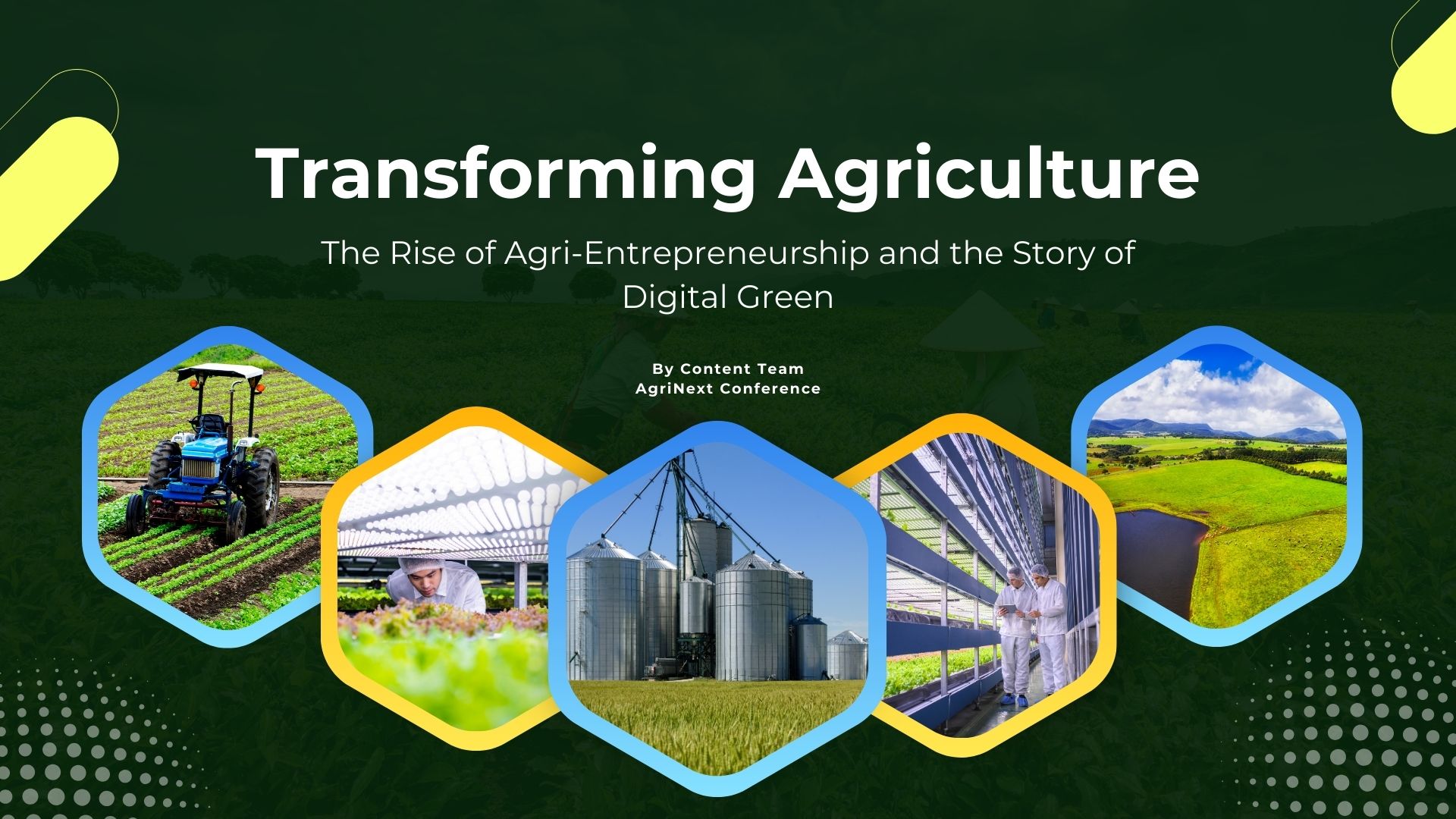
“The best source of information for farmers is other farmers”
Introduction
For years, the agricultural sector has witnessed a significant transformation with the emergence of agri-entrepreneurship. Combining innovative business ideas with traditional farming practices, agri-entrepreneurship is driving growth and sustainability in agriculture. This new wave of entrepreneurs is utilizing technology, market demands, and supportive policies to revolutionize the way we produce, process, and distribute food.
The Evolution of Agri-Entrepreneurship
Historically, agriculture was based on traditional farming methods, usually involving small farms and local markets.
However, the landscape is changing rapidly. Several factors are responsible for the the rise of agri-entrepreneurship:
Technological Advancements:
From precision farming to automated machinery, technology is enabling farmers to increase efficiency and productivity.
Market Demand: Consumers are increasingly demanding organic and sustainably produced food, creating new opportunities for agri-businesses.
Policy Support: Governments worldwide are implementing policies and programs to support innovation and entrepreneurship in agriculture.
Key Areas of Innovation Technology in Agriculture
Precision Farming
The use of IoT, AI, and big data allows farmers to monitor crops and soil conditions in real-time, optimizing inputs and maximizing yields.
Drones
Drones are being used for aerial surveys, crop monitoring, and even planting, reducing labour costs and increasing efficiency.
Blockchain
Blockchain technology is enhancing supply chain transparency, ensuring food safety and traceability.
Sustainable Farming Practices
Organic Farming: With the growing market for organic products, farmers are adopting organic methods to meet consumer demand.
Regenerative Agriculture: Practices that restore soil health and biodiversity are gaining popularity as a way to combat climate change.
Vertical and Urban Farming: Innovations in vertical and urban farming are making it possible to grow food in urban areas, reducing the carbon footprint and increasing local food production.
Agri-Tech Startups
Farm Management Software
Startups are developing software to help farmers manage their operations more efficiently.
Automated Machinery: Robotics and automated machinery are reducing labour costs and increasing productivity.
Biotech Innovations: Advances in biotechnology are leading to the development of pest-resistant and high-yield crops.
Value-Added Products
Processing and Packaging
Innovative processing and packaging techniques are adding value to raw agricultural products, creating new revenue streams for farmers.
Niche Markets: Agri-entrepreneurs are tapping into specialized markets for specialty foods, organic products, and artisanal goods.
Market Access and Distribution
E-commerce platforms allow farmers to sell their products directly to consumers, eliminating the need for traditional middlemen.
Supply Chain Logistics: Innovations in logistics are reducing food wastage and improving distribution efficiency.
Challenges and Opportunities
Despite the promising landscape, agri-entrepreneurs face several challenges, including:
Funding: Access to capital remains a significant hurdle for many startups.
Market Access: Entering and competing in established markets can be difficult.
Regulatory Hurdles: Navigating complex regulations can be time-consuming and costly.
However, there are numerous opportunities for growth and scaling:
Government Schemes: Many governments offer grants, subsidies, and other incentives to support agri-entrepreneurs.
Investor Interest: Increasing interest from investors in agri-tech and sustainable farming ventures.
International Markets: Expanding into global markets can open up new revenue streams and growth opportunities.
The Role of Policy and Support Systems
Governments play a crucial role in fostering agri-entrepreneurship through supportive policies and programs. These include:
Subsidies and Grants: Financial support to reduce the burden of initial investment.
Incubators and Accelerators: Programs that provide mentorship, networking, and resources to startups.
Research and Development: Funding for R&D to drive innovation in agriculture.Real Story:
The Journey of Rikin Gandhi and Digital Green
Rikin Gandhi, an Indian-American aerospace engineer turned agri-entrepreneur, has made a profound impact on the agricultural sector through his organization, Digital Green.
Rikin has a bachelor’s in computer science from Carnegie Mellon University, a master’s in aeronautical and astronautical engineering from MIT, and is a licensed private pilot.His story is an inspiring example of how technology and innovation can empower farmers and transform agriculture.
Who we are Digital Green
Digital Green is a global development organization that is building an AI-powered assistant to help small-scale farmers around the world improve their productivity and incomes. Since 2008, it has worked with frontline extension agents to boost the cost-effectiveness of public extension systems by offering innovative development models, technologies, and services to farmers. The result has been a 10-fold cut in costs and a 24% rise in income levels. But our work is far from done.
The Beginning
Rikin Gandhi’s journey into agriculture was unconventional. Initially trained as an aerospace engineer, he worked with Oracle in the United States. However, his desire to make a noticeable impact on people’s lives led him to India, where he joined Microsoft Research. It was here that he began exploring ways to utilize technology for social good.
The Birth of Digital Green
In 2008, Rikin co-founded Digital Green, an organization aimed at improving the livelihoods of smallholder farmers through technology and community engagement.
“To create a world whereFarmers use technology and data to buildProsperous communities”.
Rikin Gandhi founded Digital Green to use peer-to-peer farming videos to increase the efficiency of agricultural extension services. Digital Green is now developing FarmStack, an open platform to enable the 2 million smallholder farmers across Sub-Saharan Africa and South Asia it works with to control and share their own data, with support from the Bill & Melinda Gates Foundation, Bill & Melinda Gates Foundation
DFID (DFID), Walmart FoundationWalmart Foundation, and others. Rikin also co-founded Loop, a shared logistics service to route farmer produce to markets, which spun off from Digital Green.
Impact and Growth
Digital Green has grown significantly since its establishment impacting over 1.5 million farmers across India and Africa. The organization collaborates with governments, NGOs, and community groups to scale its efforts.
Key achievements include
Digital Green has achieved several key milestones
Increased Farmer Reach: Digital Green has provided over 5.6 million farmers, 60% of whom are women, with information to improve farm productivity and harvest quality.
Cost-Effective Solutions: Their methods have reduced the cost per farmer of adopting more efficient farming practices from $35 to $3.50, making their approach 10 times more cost-effective than traditional methods.
Enhanced Farmer Incomes: They have helped increase farmer incomes by up to 24% through the adoption of better agricultural practices.
Use of AI and Technology: Digital Green utilizes AI to provide customized advisories in local languages, boosting the efficiency of public extension systems and supporting frontline extension workers .
Farmer-to-Farmer Videos: They have institutionalized the use of farmer-to-farmer videos, enabling local farmers to share their knowledge and experiences, which has been critical in spreading best practices .
These achievements reflect Digital Green’s commitment to empowering smallholder farmers with the tools and knowledge they need to improve their livelihoods.
Challenges and Solutions
Rikin and his team faced several challenges, including
Convincing farmers to adopt new technologies and practices was initially challenging.
The participatory video approach helped overcome this by building trust through local farmer testimonials.
Limited access to technology and infrastructure in rural areas posed a challenge.
Digital Green addressed this by using portable projectors and low-cost video equipment.
Future Vision
Looking ahead, Rikin Gandhi envisions expanding Digital Green’s reach and impact. The organization aims to integrate more advanced technologies, such as mobile applications and data analytics, to provide personalized support to farmers. Additionally, there is a focus on scaling the model to new regions and countries, further empowering farmers globally.
Conclusion
Agri-entrepreneurship is transforming the agricultural sector, bringing innovation, sustainability, and new business opportunities. Rikin Gandhi’s visionary leadership and innovative approach have significantly transformed agricultural extension services, empowering millions of smallholder farmers across the globe. His work with Digital Green and FarmStack exemplifies his commitment to leveraging technology and community-driven solutions to enhance agricultural productivity and sustainability.
By combining traditional farming knowledge with modern business practices, agri-entrepreneurs are ready to shape the future of agriculture. Whether you are an aspiring agri-entrepreneur or a stakeholder in the agricultural ecosystem, supporting and embracing these innovations is key to ensuring a resilient and sustainable agricultural future.
The AgriNext Awards Conference & Expo
The AgriNext Awards Conference & Expo is a premier event dedicated to advancing agricultural technology and innovation. Scheduled for November 13-14, 2024, in Dubai, it brings together industry leaders, innovators, and experts to discuss the latest trends and solutions in agriculture. The conference features a diverse lineup of speakers and exhibitors who focus on cutting-edge topics such as precision agriculture, vertical farming, blockchain technology, and sustainable practices.
Signup For AgriNext Conference Newsletter

